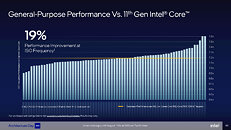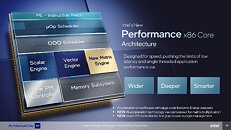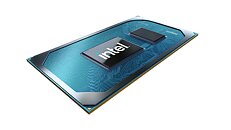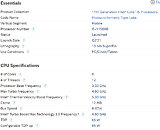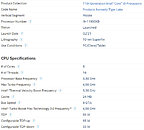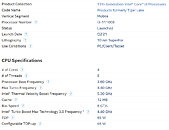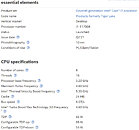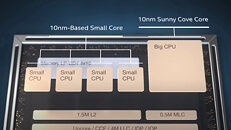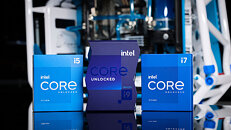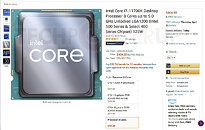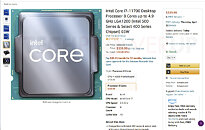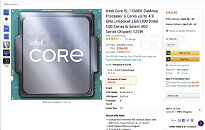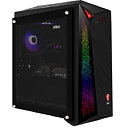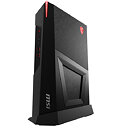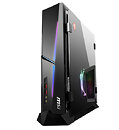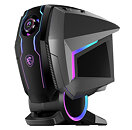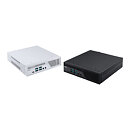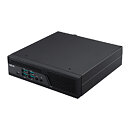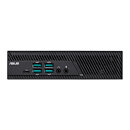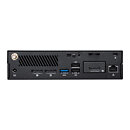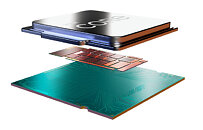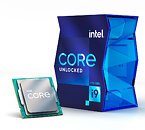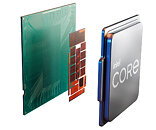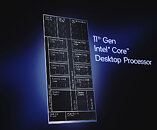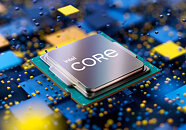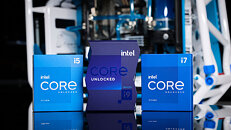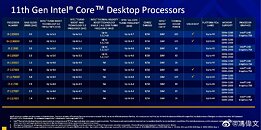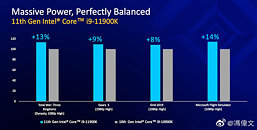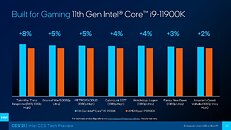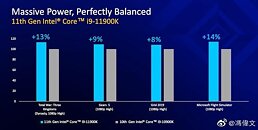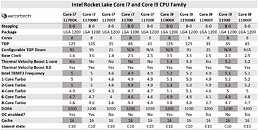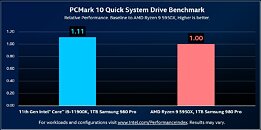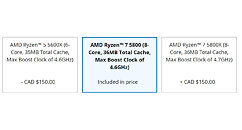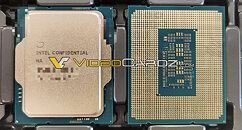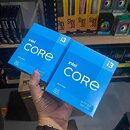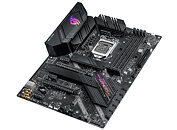Apr 24th, 2025 19:51 EDT
change timezone
Latest GPU Drivers
New Forum Posts
- Are the 8 GB cards worth it? (172)
- What's your latest tech purchase? (23590)
- What are you playing? (23460)
- GameTechBench GPU benchmark is already out! (351)
- New OLED monitor makes PC unresponsive sometimes (23)
- AMD RX 9070 XT & RX 9070 non-XT thread (OC, undervolt, benchmarks, ...) (96)
- Have you got pie today? (16676)
- Milestones (14019)
- WCG Daily Numbers (12848)
- 5060 Ti 8GB DOA (270)
Popular Reviews
- NVIDIA GeForce RTX 5060 Ti 8 GB Review - So Many Compromises
- Crucial CUDIMM DDR5-6400 128 GB CL52 Review
- Colorful iGame B860M Ultra V20 Review
- ASUS GeForce RTX 5060 Ti TUF OC 16 GB Review
- ASRock X870E Taichi Lite Review
- Upcoming Hardware Launches 2025 (Updated Apr 2025)
- Sapphire Radeon RX 9070 XT Pulse Review
- Sapphire Radeon RX 9070 XT Nitro+ Review - Beating NVIDIA
- AMD Ryzen 7 9800X3D Review - The Best Gaming Processor
- NVIDIA GeForce RTX 5060 Ti PCI-Express x8 Scaling
Controversial News Posts
- NVIDIA GeForce RTX 5060 Ti 16 GB SKU Likely Launching at $499, According to Supply Chain Leak (182)
- NVIDIA Sends MSRP Numbers to Partners: GeForce RTX 5060 Ti 8 GB at $379, RTX 5060 Ti 16 GB at $429 (127)
- NVIDIA Launches GeForce RTX 5060 Series, Beginning with RTX 5060 Ti This Week (115)
- Nintendo Confirms That Switch 2 Joy-Cons Will Not Utilize Hall Effect Stick Technology (105)
- Nintendo Switch 2 Launches June 5 at $449.99 with New Hardware and Games (99)
- Sony Increases the PS5 Pricing in EMEA and ANZ by Around 25 Percent (84)
- NVIDIA PhysX and Flow Made Fully Open-Source (77)
- Windows Notepad Gets Microsoft Copilot Integration (75)
News Posts matching #Rocket Lake-S
Return to Keyword Browsing
Intel's Next-Gen Desktop Platform Intros Socket LGA1851, "Meteor Lake-S" to Feature 6P+16E Core Counts
Keeping up with the cadence of two generations of desktop processors per socket, Intel will turn the page of the current LGA1700, with the introduction of the new Socket LGA1851. The processor package will likely have the same dimensions as LGA1700, and the two sockets may share cooler compatibility. The first processor microarchitecture to debut on LGA1851 will be the 14th Gen Core "Meteor Lake-S." These chips will feature a generationally lower CPU core-count compared to "Raptor Lake," but significantly bump the IPC on both the P-cores and E-cores.
"Raptor Lake" is Intel's final monolithic silicon client processor before the company pivots to chiplets built on various foundry nodes, as part of its IDM 2.0 strategy. The client-desktop version of "Meteor Lake," dubbed "Meteor Lake-S," will have a maximum CPU core configuration of 6P+16E (that's 6 performance cores with 16 efficiency cores). The chip has 6 "Redwood Cove" P-cores, and 16 "Crestmont" E-cores. Both of these are expected to receive IPC uplifts, such that the processor will end up faster (and hopefully more efficient) than the top "Raptor Lake-S" part. Particularly, it should be able to overcome the deficit of 2 P-cores.
"Raptor Lake" is Intel's final monolithic silicon client processor before the company pivots to chiplets built on various foundry nodes, as part of its IDM 2.0 strategy. The client-desktop version of "Meteor Lake," dubbed "Meteor Lake-S," will have a maximum CPU core configuration of 6P+16E (that's 6 performance cores with 16 efficiency cores). The chip has 6 "Redwood Cove" P-cores, and 16 "Crestmont" E-cores. Both of these are expected to receive IPC uplifts, such that the processor will end up faster (and hopefully more efficient) than the top "Raptor Lake-S" part. Particularly, it should be able to overcome the deficit of 2 P-cores.

Intel 13th Gen Core "Raptor Lake" Media Kit Pictured
Intel tends to send out elaborate media kits with their pre-launch processor review samples. One such kit landed with Caseking, which posted a reveal of what it could look like. A large cardboard box roughly the size of an ATX motherboard box shimmers with holographic film on all its sides. You open its lid to reveal a giant picture of a "Raptor Lake-S" (8P+16E) die. In real life, this die is roughly 260 mm² in area (about that of a postage stamp). The bottom end of this "die" opens out in two segments, one reveals an acrylic memento with another enlarged "Raptor Lake" die, which you can hang on a wall or as a backdrop in your streams; while the other half reveals two paperboard jewel-cases, one contains the Core i9-13900K (8P+16E), and the other a Core i5-13600K (6P+8E). Fancy media kits aren't new, and most hardware companies send them with their major product releases, so sites can optionally do an unboxing preview at a date before that of the review. You can watch Caseking's unboxing video from the source link below.

Intel Golden Cove P-Core Offers 19% IPC Gain Over Cypress Cove (Rocket Lake)
The 8 "Golden Cove" performance cores (P-cores) present on 12th Gen "Alder Lake-S" desktop processors offer an IPC gain of 19% over the "Cypress Cove" cores powering current 11th Gen "Rocket Lake-S" processors, claims Intel. This would put them at roughly 35% higher IPC than the "Skylake" cores that powered Intel client desktop processors until as recently as 2020, with the 10th Gen "Comet Lake." This 19% number, however, is presented as a geomean of performance improvement at iso-frequency, across a wide selection of tests that include SPEC CPU 2017, SYSmark 25, Crossmark, PCMark 10, WebXPRT3, and Geekbench 5.4.1.
The high IPC of the P-cores, coupled with the high rumored frequencies for the enthusiast i9-12900K part running well into 5.30 GHz or beyond, begins to explain how 8 of these "Golden Cove" cores, coupled with 8 fairly fast "Gracemont" cores, closes in on the 16-core AMD Ryzen 9 5950X at Cinebench R20.
The high IPC of the P-cores, coupled with the high rumored frequencies for the enthusiast i9-12900K part running well into 5.30 GHz or beyond, begins to explain how 8 of these "Golden Cove" cores, coupled with 8 fairly fast "Gracemont" cores, closes in on the 16-core AMD Ryzen 9 5950X at Cinebench R20.

Intel Core i7-1195G7 Scores 1700 Points in Geekbench V5 Single-Core
The recently announced flagship Intel i7-1195G7 11th generation Tiger Lake mobile processor with a 5.0 GHz single turbo clock has recently been tested in Geekbench V5. The processor achieved an extremely impressive score of 1700 points in single-core performance which puts it above many desktop-class processors including the Ryzen 5000X lineup and only just below Intel's Rocket Lake-S desktop processors. The benchmarks come from a pre-production CLEVO NV4XMJ unit with the processor scoring between 1662 to 1700 points across three samples. We expect further benchmarks for the new processor to be available imminently as the CPU is already available in select products.

Intel Launches 10nm "Tiger Lake" Desktop Processors
Intel is likely preparing to launch its 10 nm "Tiger Lake" processor on the desktop platform. momomo_us discovered the existence of at least four new processor SKUs in Intel's ARK pages. At least one of these is marked as a desktop chip. What isn't clear, is whether these are Socket LGA1200 chips, like "Rocket Lake-S," or whether these are FC-BGA chips that have been adapted for specific desktop use-cases, such as NUCs. At the heart of these chips is the new 10 nm "Tiger Lake" 8-core/16-thread silicon, which packs 8 "Willow Cove" CPU cores, 24 MB of shared L3 cache, and a Gen12 Xe LP iGPU that has 32 EUs.
The common theme with the processor model numbering with these SKUs is the brand extension "B," next to model numbers we commonly associate with "Rocket Lake-S" SKUs. Another commonality is TDP. All four SKUs are marked as 65-Watt chips, including the part that has an unlocked multiplier. The lineup is led by the Core i9-11900KB, an 8-core/16-thread chip with Thermal Velocity Boost frequency of up to 5.30 GHz, and base frequency of 3.30 GHz. The Core i7-11700B lacks an unlocked multiplier, but interestingly features TVB, and retains the core-count and cache amount of the i9-11900KB. It is clocked at speeds of up to 5.30 GHz. The Core i5-11500B is a 6-core/12-thread part, with 12 MB of L3 cache, and the same 5.30 GHz boost, set via TVB. The Core i3-11100B is a 4-core/8-thread part with 8 MB L3 cache, and is likely based on the 4-core "Tiger Lake" die, with its iGPU cut down. The clocks remain the same. It remains to be seen how Intel markets these parts.
The common theme with the processor model numbering with these SKUs is the brand extension "B," next to model numbers we commonly associate with "Rocket Lake-S" SKUs. Another commonality is TDP. All four SKUs are marked as 65-Watt chips, including the part that has an unlocked multiplier. The lineup is led by the Core i9-11900KB, an 8-core/16-thread chip with Thermal Velocity Boost frequency of up to 5.30 GHz, and base frequency of 3.30 GHz. The Core i7-11700B lacks an unlocked multiplier, but interestingly features TVB, and retains the core-count and cache amount of the i9-11900KB. It is clocked at speeds of up to 5.30 GHz. The Core i5-11500B is a 6-core/12-thread part, with 12 MB of L3 cache, and the same 5.30 GHz boost, set via TVB. The Core i3-11100B is a 4-core/8-thread part with 8 MB L3 cache, and is likely based on the 4-core "Tiger Lake" die, with its iGPU cut down. The clocks remain the same. It remains to be seen how Intel markets these parts.

BIOSTAR Unveils B560M-SILVER Motherboard
BIOSTAR, a leading manufacturer of motherboards, graphics cards, and storage devices today, announces the B560M-SILVER motherboard designed to run Intel 11th gen Rocket Lake-S processors. Based on the Intel B560 chipset, the B560M-SILVER motherboard is the best choice for casual gaming and content creation. With an array of the latest technologies like PCIe 4.0 support and WiFi 6, it excels at any task thrown at it. Eye-catching aesthetics coupled with a feature-rich setup makes the B560M-SILVER motherboard a no-brainer choice among the general consumers. Capable of running up to 128 GB of DDR4 Memory on dual-channel 4 DIMM slots with a boost clock speed that can reach 4000+(OC) when overclocked.
The motherboard is designed for all purposes, handling all the best hardware in many performance-heavy tasks. Powered by BIOSTAR's Digital PWM technology, it drastically increases system efficiency and hardware reliability and has faster transient performance. Features like Dr. Mos help users set up smooth overclock values while BIOSTAR's proprietary Tough Power Connectors ensure the stability and reliability of the power supply.
The motherboard is designed for all purposes, handling all the best hardware in many performance-heavy tasks. Powered by BIOSTAR's Digital PWM technology, it drastically increases system efficiency and hardware reliability and has faster transient performance. Features like Dr. Mos help users set up smooth overclock values while BIOSTAR's proprietary Tough Power Connectors ensure the stability and reliability of the power supply.

Intel Core "Alder Lake-S" to Launch in November 2021
Intel's 11th Gen Core "Rocket Lake-S" could have a brief stint as the tip of Intel's desktop spear. Wccftech reports that its successor, the 12th Gen Core "Alder Lake-S," could launch by November 2021. The processor debuts on the new LGA1700 socket, and will introduce many firsts to the platform. The biggest change will be the heterogenous CPU core architecture. The top-spec "Alder Lake-S" is believed to be a 16-core/24-thread processor. From these, 8 will be larger high-performance cores, featuring HyperThreading, while the other 8 will be smaller high-efficiency cores. The chip is expected to be built on the 10 nm SuperFin process, and hence Intel is expected to significantly lower power draw of desktops when the machine is idling or handling lighter desktop loads.
Besides the major update to the CPU cores, "Alder Lake-S" is expected to continue featuring a Xe LP based integrated graphics solution. Significant changes with the I/O are expected, including DDR5 memory support with backwards compatibility for DDR4, and PCI-Express Gen 5.0. The LGA1700 socket is significantly different from the various LGA115x/LGA1200 sockets Intel has been pulling for its mainstream desktop platforms since 2009. It could trigger the need for new CPU coolers that support the socket.
Besides the major update to the CPU cores, "Alder Lake-S" is expected to continue featuring a Xe LP based integrated graphics solution. Significant changes with the I/O are expected, including DDR5 memory support with backwards compatibility for DDR4, and PCI-Express Gen 5.0. The LGA1700 socket is significantly different from the various LGA115x/LGA1200 sockets Intel has been pulling for its mainstream desktop platforms since 2009. It could trigger the need for new CPU coolers that support the socket.

Intel 11th Gen "Rocket Lake" Pricing Already Going Down on Amazon
Prices of retail 11th Gen Intel Core "Rocket Lake" desktop processors are beginning to settle down close to the "1,000-unit tray" prices on Amazon (US). The 1K-unit tray prices have traditionally served as a de facto baseline for retail prices, and as of today (April 16), we see several SKUs popular with gamers and PC enthusiasts approach levels close to the baseline. This wouldn't strictly be a price-cut, since they are still higher than the baseline, but would be a trimming of the retailer mark-ups traditionally attached to new processor launches.
As of this writing, the retail Core i7-11700K is listed on Amazon (US) for USD $404, practically identical to the $399 1K-unit tray price. The i7-11700 (non-K) can be had for $339.99, very close to the $323.99 tray price. The Core i5-11600K is going for $264.99, which is almost identical to the $262 tray price. Lesser "locked" SKUs such as the i5-11500 are within $10-15 of their tray pricing. It's only the top-dog Core i9-11900K and i9-11900KF that remain heavily marked up by sellers on Amazon. At these prices, the 11th Gen Core processors are expected to apply pressure on sellers of AMD Ryzen 5000 series processors to review the prices of SKUs such as the Ryzen 7 5800X and Ryzen 5 5600X; and on AMD to release cheaper Ryzen 5000 series SKUs in the retail channel.
As of this writing, the retail Core i7-11700K is listed on Amazon (US) for USD $404, practically identical to the $399 1K-unit tray price. The i7-11700 (non-K) can be had for $339.99, very close to the $323.99 tray price. The Core i5-11600K is going for $264.99, which is almost identical to the $262 tray price. Lesser "locked" SKUs such as the i5-11500 are within $10-15 of their tray pricing. It's only the top-dog Core i9-11900K and i9-11900KF that remain heavily marked up by sellers on Amazon. At these prices, the 11th Gen Core processors are expected to apply pressure on sellers of AMD Ryzen 5000 series processors to review the prices of SKUs such as the Ryzen 7 5800X and Ryzen 5 5600X; and on AMD to release cheaper Ryzen 5000 series SKUs in the retail channel.

MSI Announces Gaming Desktops Powered by 11th Gen Core "Rocket Lake" Processors
As a world leading gaming brand, MSI is the most trusted name in gaming and eSports. We stand by our principles of breakthroughs in design, the pursuit of excellence, and technological innovation. Integrating gamers' most coveted extreme performance, realistic visuals, authentic sound, precise control and smooth streaming functions into its gaming rigs, MSI frees gamers from tedious trial and error and pushes gaming performance beyond limits. The determination to surpass past achievements has made MSI a True Gaming brand with gaming spirit throughout the industry!
MSI announced a gaming desktop equipped with Intel 11th Gen Rocket Lake-S processor. The 11th generation Intel Core processor adopts Cypress Cove's new architecture, which changes hardware and software efficiency and improves their performance. This allows users to achieve the perfect balance between gaming and productivity. The graphics card comes with NVIDIA RTX 3090 specifications, allowing players to enjoy the most extreme gaming experience. MSI launched a total of five models this time, from the flagship Aegis Series to the eSport Gaming Infinite Series, as well as the compact-sized Trident Series, to meet the hardware needs of different players.
MSI announced a gaming desktop equipped with Intel 11th Gen Rocket Lake-S processor. The 11th generation Intel Core processor adopts Cypress Cove's new architecture, which changes hardware and software efficiency and improves their performance. This allows users to achieve the perfect balance between gaming and productivity. The graphics card comes with NVIDIA RTX 3090 specifications, allowing players to enjoy the most extreme gaming experience. MSI launched a total of five models this time, from the flagship Aegis Series to the eSport Gaming Infinite Series, as well as the compact-sized Trident Series, to meet the hardware needs of different players.

ASUS Announces Mini PC PB62
ASUS today announced Mini PC PB62, a durable computer that delivers powerful performance to provide flexibility, expandability and performance to suit a range of business applications, including digital signage, point-of-sales (POS) system, kiosks and intelligent vending machines. Mini PC PB62 is powered by the latest desktop-grade up to 11th Generation Intel Core processor and fast DDR4 3200 MHz memory.
Engineered for performance: 11th Gen Intel Core, DDR4 3200 MHz memory and Intel Optane
With the latest up to 11th Gen Intel Core i7 processors, Mini PC PB62 is caters for with support for either a 35- or 65-watt CPU - so it's ready to be specified for supreme efficiency or maximum performance. PB62 also has built-in support for Intel Optane H20 memory, the technology that greatly improves storage speeds, enables frequently-used documents, pictures, videos and applications to be accessed more quickly while improving overall system performance to maximize productivity and efficiency.
Engineered for performance: 11th Gen Intel Core, DDR4 3200 MHz memory and Intel Optane
With the latest up to 11th Gen Intel Core i7 processors, Mini PC PB62 is caters for with support for either a 35- or 65-watt CPU - so it's ready to be specified for supreme efficiency or maximum performance. PB62 also has built-in support for Intel Optane H20 memory, the technology that greatly improves storage speeds, enables frequently-used documents, pictures, videos and applications to be accessed more quickly while improving overall system performance to maximize productivity and efficiency.

11th Gen Intel Core Unleashes Unmatched Overclocking, Game Performance
The 11th Gen Intel Core S-series desktop processors (code-named "Rocket Lake-S") launched worldwide today, led by the flagship Intel Core i9-11900K. Reaching speeds of up to 5.3 GHz with Intel Thermal Velocity Boost, the Intel Core i9-11900K delivers even more performance to gamers and PC enthusiasts.
Engineered on the new Cypress Cove architecture, 11th Gen Intel Core S-series desktop processors are designed to transform hardware and software efficiency and increase raw gaming performance. The new architecture brings up to 19% gen-over-gen instructions per cycle (IPC) improvement for the highest frequency cores and adds Intel UHD graphics featuring the Intel Xe graphics architecture for rich media and intelligent graphics capabilities. That matters because games and most applications continue to depend on high-frequency cores to drive high frame rates and low latency. Designed to Game: With its new 11th Gen desktop processors, Intel continues to push desktop gaming performance to the limits and deliver the most amazing immersive experiences for players everywhere.Read the TechPowerUp Reviews of the Core i9-11900K and Core i5-11600K.
Engineered on the new Cypress Cove architecture, 11th Gen Intel Core S-series desktop processors are designed to transform hardware and software efficiency and increase raw gaming performance. The new architecture brings up to 19% gen-over-gen instructions per cycle (IPC) improvement for the highest frequency cores and adds Intel UHD graphics featuring the Intel Xe graphics architecture for rich media and intelligent graphics capabilities. That matters because games and most applications continue to depend on high-frequency cores to drive high frame rates and low latency. Designed to Game: With its new 11th Gen desktop processors, Intel continues to push desktop gaming performance to the limits and deliver the most amazing immersive experiences for players everywhere.Read the TechPowerUp Reviews of the Core i9-11900K and Core i5-11600K.
addlink M.2 Gen4x4 SSDs Optimized For 11th Gen Intel Rocket Lake-S
addlink Gen4x4 NVMe SSD series, S90, S92, S95 are ready for the latest Intel Rocket Lake-S platform. The processors have been confirmed as going on sale on March 30.
Rocket Lake will make PCIe Gen4 SSDs fly faster than Ryzen, Intel says. Rocket lake is a code name for Intel 11th Gen's desktop chip family. It supports the PCIe 4.0 Interface, which provide twice the bandwidth of PCIe 3.0. Intel Rocket Lake-S comes two years after AMD Ryzen (X570/B550) lead industry with the first PC chips to support the PCIe 4.0 interface. During CES 2021, Intel revealed some detail about new Rocket Lake chips and claims the 11th Gen Intel Core Desktop platform delivers up to 11% better PCIe Gen 4 storage performance vs the AMD Ryzen 9 5000 platform. They also confirmed that the chips will go on sale on March 30, 2021.
Rocket Lake will make PCIe Gen4 SSDs fly faster than Ryzen, Intel says. Rocket lake is a code name for Intel 11th Gen's desktop chip family. It supports the PCIe 4.0 Interface, which provide twice the bandwidth of PCIe 3.0. Intel Rocket Lake-S comes two years after AMD Ryzen (X570/B550) lead industry with the first PC chips to support the PCIe 4.0 interface. During CES 2021, Intel revealed some detail about new Rocket Lake chips and claims the 11th Gen Intel Core Desktop platform delivers up to 11% better PCIe Gen 4 storage performance vs the AMD Ryzen 9 5000 platform. They also confirmed that the chips will go on sale on March 30, 2021.

Intel Launches 11th Gen Core "Rocket Lake": Unmatched Overclocking and Gaming Performance
The 11th Gen Intel Core S-series desktop processors (code-named "Rocket Lake-S") launched worldwide today, led by the flagship Intel Core i9-11900K. Reaching speeds of up to 5.30 GHz with Intel Thermal Velocity Boost, the Intel Core i9-11900K delivers even more performance to gamers and PC enthusiasts.
Engineered on the new Cypress Cove architecture, 11th Gen Intel Core S-series desktop processors are designed to transform hardware and software efficiency and increase raw gaming performance. The new architecture brings up to 19% gen-over-gen instructions per cycle (IPC) improvement for the highest frequency cores and adds Intel UHD graphics featuring the Intel Xe graphics architecture for rich media and intelligent graphics capabilities. That matters because games and most applications continue to depend on high-frequency cores to drive high frame rates and low latency.
Engineered on the new Cypress Cove architecture, 11th Gen Intel Core S-series desktop processors are designed to transform hardware and software efficiency and increase raw gaming performance. The new architecture brings up to 19% gen-over-gen instructions per cycle (IPC) improvement for the highest frequency cores and adds Intel UHD graphics featuring the Intel Xe graphics architecture for rich media and intelligent graphics capabilities. That matters because games and most applications continue to depend on high-frequency cores to drive high frame rates and low latency.

Intel to Unveil "Tiger Lake-H" and "Rocket Lake-S" on March 18
Intel is expected to unveil its 11th generation Core "Tiger Lake-H" performance-segment mobile processor, and the highly anticipated 11th Gen Core "Rocket Lake-S" desktop processor family on March 18, 2021. The two will be launched on the sidelines of the 2021 GDC (Game Developers Conference), an online event. The agenda page of GDC mentions both "Tiger Lake-H" and "Rocket Lake." The "Tiger Lake-H" family of processors begin with quad-core SKUs based on the 4-core "Tiger Lake" silicon, extending to 6-core and 8-core ones based on a newer 8-core silicon. Both dies are built on the 10 nm SuperFin node, and combine Intel's highest-IPC "Willow Cove" CPU cores with a Gen 12 Xe iGPU.
The 11th Gen Core "Rocket Lake-S" has been unveiled back at the 2021 International CES (online event) in January, and is heading toward a mid/late-March launch. The chips pack up to eight "Cypress Cove" CPU cores, which are a back-port of Intel's 10 nm CPU core architectures to the 14 nm node, bringing the first IPC increase on the client desktop platform from Intel since 2015. At GDC, we expect Intel to detail individual SKUs within the 11th Gen Core processor family, giving us a broader idea of what chips will launch this month. The GDC backdrop also foreshadows the marketing strategy for Intel with both these platforms—gaming. The company will take advantage of the IPC uplift to present its processors as being better for gaming, and sufficiently fast in most client-relevant tasks. The GDC backdrop could also let Intel show off the ISV relations it's built with game developers, detailing how certain popular game engines are optimized for Intel.
The 11th Gen Core "Rocket Lake-S" has been unveiled back at the 2021 International CES (online event) in January, and is heading toward a mid/late-March launch. The chips pack up to eight "Cypress Cove" CPU cores, which are a back-port of Intel's 10 nm CPU core architectures to the 14 nm node, bringing the first IPC increase on the client desktop platform from Intel since 2015. At GDC, we expect Intel to detail individual SKUs within the 11th Gen Core processor family, giving us a broader idea of what chips will launch this month. The GDC backdrop also foreshadows the marketing strategy for Intel with both these platforms—gaming. The company will take advantage of the IPC uplift to present its processors as being better for gaming, and sufficiently fast in most client-relevant tasks. The GDC backdrop could also let Intel show off the ISV relations it's built with game developers, detailing how certain popular game engines are optimized for Intel.

Intel Core i9 and Core i7 "Rocket Lake" Lineup Leaked, Claims Beating Ryzen 9 5900X
Intel is planning to debut its 11th Generation Core "Rocket Lake-S" desktop processor family with a fairly large selection of SKUs, according to leaked company slides shared by VideoCardz, which appear to be coming from the same source as an earlier report from today that talk about double-digit percent gaming performance gains over the previous generation. Just the Core i9 and Core i7 series add up to 10 SKUs between them. These include unlocked- and iGPU-enabled "K" SKUs, unlocked but iGPU-disabled "KF," locked but iGPU-enabled parts, and locked and iGPU-disabled "F" parts.
With "Rocket Lake-S," Intel appears to have hit a ceiling with the number of CPU cores it can cram onto a die alongside an iGPU, on the 75 mm x 75 mm LGA package, while retaining its 14 nm silicon fabrication node. Both the Core i9-11900 series and the Core i7-10700 series are 8-core/16-thread parts, with an identical amount of cache. They are differentiated on the basis of clock speeds as tabled below, and the lack of the Thermal Velocity Boost feature on the Core i7 parts. The Core i5 series "Rocket Lake-S" parts are reportedly 6-core/12-thread.
With "Rocket Lake-S," Intel appears to have hit a ceiling with the number of CPU cores it can cram onto a die alongside an iGPU, on the 75 mm x 75 mm LGA package, while retaining its 14 nm silicon fabrication node. Both the Core i9-11900 series and the Core i7-10700 series are 8-core/16-thread parts, with an identical amount of cache. They are differentiated on the basis of clock speeds as tabled below, and the lack of the Thermal Velocity Boost feature on the Core i7 parts. The Core i5 series "Rocket Lake-S" parts are reportedly 6-core/12-thread.

Intel Core i9-11900K "Rocket Lake" Gaming Performance Leaked
An alleged Intel marketing slide highlighting the gaming performance advances of the company's upcoming Core i9-11900K "Rocket Lake" processor was leaked to the web. The slide compares the i9-11900K to the previous generation i9-10900K "Comet Lake-S," showing that despite two fewer CPU cores, the new chip is able to post double-digit percent gaming performance gains. At 1080p resolution, which is relevant to CPU testing as it highlights bottlenecks at the CPU-level, the i9-11900K is claimed to gain over 13% in frame-rates with "Total War: Three Kingdoms," and a significant 14% with Microsoft Flight Simulator. "Gears 5" shows a 9% performance gain, while GRID 2019 is 8% faster.
The Core i9-11900K owes its gaming performance gains to the IPC increase (single-thread performance increase) from the new "Cypress Cove" CPU cores. The "Rocket Lake-S" silicon features up to 8 "Cypress Cove" cores, which are believed to be a back-port of the "Willow Cove" core to the 14 nm silicon fabrication node, albeit with modifications, such as lower L2 cache sizes. Intel is looking to restore PC gaming performance leadership with the 11th Gen Core desktop processor series. The chips are expected to launch later this month.
The Core i9-11900K owes its gaming performance gains to the IPC increase (single-thread performance increase) from the new "Cypress Cove" CPU cores. The "Rocket Lake-S" silicon features up to 8 "Cypress Cove" cores, which are believed to be a back-port of the "Willow Cove" core to the 14 nm silicon fabrication node, albeit with modifications, such as lower L2 cache sizes. Intel is looking to restore PC gaming performance leadership with the 11th Gen Core desktop processor series. The chips are expected to launch later this month.

Intel Confirms March 30 for Rocket Lake-S Launch
Intel in a statement to Hardwareluxx has confirmed that the release date for the company's next-gen CPU family, codenamed Rocket Lake-S, will indeed see a global launch come March 30th. The 11000 family of CPUs is already being sold on Germany, however, via etailer Mindfactory.de, who apparently jumped the gun on the actual availability of said CPUs. Mindfactory only ships within Germany, meaning that that country is actually the sole current field for Intel's latest-gen CPUs. The etailer says that they have the right to sell the CPUs, and stands by its decision, which likely means that their supplier failed to convey the proper NDAs and launch dates when selling - or so we're led to believe. That's the reason why benchmarks of Intel's 11000-series are already in the wild - even for currently unannounced CPUs, such as the Core i7-11700K.
WCCFTech over the weekend got their hands on the full table for Intel's upcoming Core i9 and Core i7 products (at least those available at launch). Mainstream CPUs on the Core i5 family and below weren't listed, however. It remains to be seen whether the previously speculated March 15th launch date will actually be the official announcement date from Intel, of if something else is afoot for that particular day of March.
WCCFTech over the weekend got their hands on the full table for Intel's upcoming Core i9 and Core i7 products (at least those available at launch). Mainstream CPUs on the Core i5 family and below weren't listed, however. It remains to be seen whether the previously speculated March 15th launch date will actually be the official announcement date from Intel, of if something else is afoot for that particular day of March.

Intel Core i7-11700K "Rocket Lake" Shows Up on European Retailer for 469€
The upcoming Intel Core i7-11700K "Rocket Lake-S" desktop processor showed up on European Retailer Mindfactory.de as a pre-order, listed at 469€ (including VAT). This is a huge step up from the retailer's current selling price of the i7-10700K "Comet Lake-S" of 317.50€, although roughly in line with its launch price. The i7-11700K is an 8-core/16-thread processor, which steps up performance over the previous-gen using the updated "Cypress Cove" CPU cores that come with increased IPC. The processor features a maximum Turbo Boost Max 3.0 frequency of 5.00 GHz, and 16 MB of shared L3 cache. The chip is differentiated from the top-dog Core i9-11900K only by frequency, with the flagship chip featuring max boost frequency of 5.10 GHz, along with the Thermal Velocity Boost feature. The Core i7-11700K comes in a simple paperboard box that lacks an included cooling solution.

"Rocket Lake" Offers 11% Higher PCIe Gen4 NVMe Storage Performance: Intel
Intel claims that its upcoming 11th Gen Core "Rocket Lake-S" desktop processors offer up to 11% higher storage performance than competing AMD Ryzen 5000 processors, when using the CPU-attached M.2 NVMe slot. A performance slide released by Intel's Ryan Shrout shows a Samsung 980 PRO 1 TB PCI-Express 4.0 x4 M.2 NVMe SSD performance on a machine powered by a Core i9-11900K processor, compared to one powered by an AMD Ryzen 9 5950X. PCMark 10 Quick System Drive Benchmark is used to evaluate storage performance on both machines. On both machines a separate drive is used as the OS/boot drive, and the Samsung 980 PRO is used as a test drive, free from any OS role.
The backup page for the slide provides details of the system configurations used for both machines. What it doesn't mention, however, is whether on the AMD machine, the 980 PRO was installed on the CPU-attached M.2 NVMe slot, or one that's attached to the AMD X570 chipset. Unlike the Intel Z590, the AMD X570 puts out downstream PCI-Express 4.0, which motherboard designers can use to put out additional NVMe Gen 4 slots. On the Intel Z590 motherboard, the M.2 NVMe Gen 4 slot the drive was tested on is guaranteed to be the CPU-attached one, as the Z590 PCH puts out PCIe Gen 3 downstream lanes. A PCI-Express 4.0 x4 link is used as chipset bus on the AMD X570, offering comparable bandwidth to the DMI 3.0 x8 (PCI-Express 3.0 x8) employed on the Intel Z590. A drive capable of attaining 7 GB/s sequential transfers should be in a sub-optimal situation on a chipset-attached M.2 slot. It would be nice if Intel clears this up in an update to its backup.
Update 02:51 UTC: In response to a specific question on Twitter, on whether the drives were tested on CPU-attached M.2 slots on both platforms, Ryan Shrout stated that a PCI-Express AIC riser card was used on both platforms to ensure that the drives are CPU-attached. 11% is a significant storage performance uplift on offer.
The backup page for the slide provides details of the system configurations used for both machines. What it doesn't mention, however, is whether on the AMD machine, the 980 PRO was installed on the CPU-attached M.2 NVMe slot, or one that's attached to the AMD X570 chipset. Unlike the Intel Z590, the AMD X570 puts out downstream PCI-Express 4.0, which motherboard designers can use to put out additional NVMe Gen 4 slots. On the Intel Z590 motherboard, the M.2 NVMe Gen 4 slot the drive was tested on is guaranteed to be the CPU-attached one, as the Z590 PCH puts out PCIe Gen 3 downstream lanes. A PCI-Express 4.0 x4 link is used as chipset bus on the AMD X570, offering comparable bandwidth to the DMI 3.0 x8 (PCI-Express 3.0 x8) employed on the Intel Z590. A drive capable of attaining 7 GB/s sequential transfers should be in a sub-optimal situation on a chipset-attached M.2 slot. It would be nice if Intel clears this up in an update to its backup.
Update 02:51 UTC: In response to a specific question on Twitter, on whether the drives were tested on CPU-attached M.2 slots on both platforms, Ryan Shrout stated that a PCI-Express AIC riser card was used on both platforms to ensure that the drives are CPU-attached. 11% is a significant storage performance uplift on offer.

Dell Lists an AMD "Ryzen 7 5800" (non-X) Option
AMD appears to be taking baby steps toward expanding its Ryzen 5000 "Zen 3" desktop processor lineup. Dell Canada has started listing a model of the processor series not yet available in the DIY retail channel, the Ryzen 7 5800 (non-X). This isn't a typo, as the option is listed next to the 5800X. The Ryzen 7 5800 is described as being an 8-core part, much like the 5800X, but has a slightly lower max boost frequency of 4.60 GHz, as opposed to 4.70 GHz of the 5800X. It could have a lower nominal (base) frequency compared to the 5800X, and possibly even a lower TDP. The last time AMD released an OEM-exclusive non-X SKU was the Ryzen 9 3900 12-core processor.
AMD's current retail-channel (PIB) lineup of Ryzen 5000 series desktop processors starts at $299 for the 6-core Ryzen 5 5600X, with the company still selling Ryzen 3000-series SKUs such as the 8-core Ryzen 7 3700X under this price. We expect the company to flesh out the 5000-series with SKUs such as the "Ryzen 5 5600 (non-X)," later this year, in response to Intel's 11th Gen Core i5 series based on the "Rocket Lake-S" silicon. Given the fate of the Ryzen 9 3900, we don't expect a broad retail launch of the Ryzen 7 5800.
AMD's current retail-channel (PIB) lineup of Ryzen 5000 series desktop processors starts at $299 for the 6-core Ryzen 5 5600X, with the company still selling Ryzen 3000-series SKUs such as the 8-core Ryzen 7 3700X under this price. We expect the company to flesh out the 5000-series with SKUs such as the "Ryzen 5 5600 (non-X)," later this year, in response to Intel's 11th Gen Core i5 series based on the "Rocket Lake-S" silicon. Given the fate of the Ryzen 9 3900, we don't expect a broad retail launch of the Ryzen 7 5800.

Intel Rocket Lake-S Lands on March 15th, Alder Lake-S Uses Enhanced 10 nm SuperFin Process
In the latest round of rumors, we have today received some really interesting news regarding Intel's upcoming lineup of desktop processors. Thanks to HKEPC media, we have information about the launch date of Intel's Rocket Lake-S processor lineup and Alder Lake-S details. Starting with Rocket Lake, Intel did not unveil the exact availability date on these processors. However, thanks to HKEPC, we have information that Rocket Lake is landing in our hands on March 15th. With 500 series chipsets already launched, consumers are now waiting for the processors to arrive as well, so they can pair their new PCIe 4.0 NVMe SSDs with the latest processor generation.
When it comes to the next generation Alder Lake-S design, Intel is reported to use its enhanced 10 nm SuperFin process for the manufacturing of these processors. This would mean that the node is more efficient than the regular 10 nm SuperFin present on Tiger Lake processors, and some improvements like better frequencies are expected. Alder Lake is expected to make use of big.LITTLE core configuration, with small cores being Gracemont designs, and the big cores being Golden Cove designs. The magic of Golden Cove is expected to result in 20% IPC improvement over Willow Cove, which exists today in Tiger Lake designs. Paired with PCIe 5.0 and DDR5 technology, Alder Lake is looking like a compelling upgrade that is arriving in December of this year. Pictured below is the LGA1700 engineering sample of Alder Lake-S processor.
When it comes to the next generation Alder Lake-S design, Intel is reported to use its enhanced 10 nm SuperFin process for the manufacturing of these processors. This would mean that the node is more efficient than the regular 10 nm SuperFin present on Tiger Lake processors, and some improvements like better frequencies are expected. Alder Lake is expected to make use of big.LITTLE core configuration, with small cores being Gracemont designs, and the big cores being Golden Cove designs. The magic of Golden Cove is expected to result in 20% IPC improvement over Willow Cove, which exists today in Tiger Lake designs. Paired with PCIe 5.0 and DDR5 technology, Alder Lake is looking like a compelling upgrade that is arriving in December of this year. Pictured below is the LGA1700 engineering sample of Alder Lake-S processor.

Intel Readies Core i9-10900KS Special Edition Processor, Refreshes "Comet Lake"
Intel is reportedly giving finishing touches to the Core i9-10900KS Special Edition desktop processor. The SKU was leaked to the web in an "eligible products list" as part of a "Crysis Remastered" game bundle campaign. This would be the third in a string of special edition processor models from Intel, after the Core i7-8086K, and the Core i9-9900KS. The i9-10900KS could be a 10-core/20-thread processor based on the "Comet Lake-S" silicon, but with higher clock-speeds than the i9-10900K, possibly even a high all-core boost frequency. The timing of this launch is curious, as we're just 6-7 weeks from market availability of the 11th Gen Core "Rocket Lake-S" launch.
In related news, Intel is refreshing the bottom end of its 10th Gen Core "Comet Lake" lineup with the company's latest corporate identity and packaging. This is probably being done to cater to entry-level 400-series chipsets such as the H410 and B460, which will not support "Rocket Lake" processors. A Malaysian tech publication posted a picture of a refreshed Core i3-10105F 4-core/8-thread processor retail package. In all likelihood, the refreshed 10th Gen chips are speed-bumps.
In related news, Intel is refreshing the bottom end of its 10th Gen Core "Comet Lake" lineup with the company's latest corporate identity and packaging. This is probably being done to cater to entry-level 400-series chipsets such as the H410 and B460, which will not support "Rocket Lake" processors. A Malaysian tech publication posted a picture of a refreshed Core i3-10105F 4-core/8-thread processor retail package. In all likelihood, the refreshed 10th Gen chips are speed-bumps.

First Comprehensive Review of the Core i7-11700K (ES) Surfaces
Lab501 posted the first comprehensive review of an Intel Core i7-11700K "Rocket Lake-S" engineering sample. The ES has clock speeds matching the rumored clock speeds of the retail version, and should give you a fair idea of how the finished product should perform. The i7-11700K, which is an 8-core/16-thread chip, was tested to be being consistently behind the AMD Ryzen 7 5800X in synthetics such as WPrime, rendering tests such as Blender, video-encoding tests such as Handbrake, and was negligibly trading blows with the 5800X at gaming ±1%. The chip does post leads over the previous-gen i7-10700K in all these areas, though.
Performance aside, the Core i7-11700K is shown to have significantly higher power draw, with the whole-system power draw being 27% higher than a 5800X-based whole-system, when measured using Prime95 (which only adds a CPU load). In a real-world scenario such as gaming, where GPU power draw is added, this whole-system power draw percentage difference should come down. Interestingly, the i7-11700K isn't a "hot" processor, running up to 18°C cooler than a 5800X under Prime95 load. Check out this, and other invaluable early insights into "Rocket Lake" by hitting the source link below.
Performance aside, the Core i7-11700K is shown to have significantly higher power draw, with the whole-system power draw being 27% higher than a 5800X-based whole-system, when measured using Prime95 (which only adds a CPU load). In a real-world scenario such as gaming, where GPU power draw is added, this whole-system power draw percentage difference should come down. Interestingly, the i7-11700K isn't a "hot" processor, running up to 18°C cooler than a 5800X under Prime95 load. Check out this, and other invaluable early insights into "Rocket Lake" by hitting the source link below.

Intel B460 and H410 Incompatibility with "Rocket Lake" Explained
Earlier this week, Intel shook the DIY PC market, particularly the vast mainstream segment, by revealing that its mid-tier B460 and entry-level H410 desktop motherboard chipsets will not be compatible with 11th Gen Core "Rocket Lake-S" processors, and that only its top-tier Z490 and H470, will. We have an explanation into what's going on, after consulting with people in the know, thanks to our friends at Hardware Zone Israel, who spoke with sources within Intel. It turns out, that some batches of B460 and H410 PCH dies are re-badged from older generations of PCH, and built on the 22 nm silicon fabrication process; whereas the Z490 and H470 are based on a newer generation that's built on 14 nm. This is similar to Intel's move to carve out the B365 chipset from the older H170.
In addition to being limited to an older version of Intel ME (Management Engine), the H460 and H410 PCH lack the ability to communicate with "Rocket Lake-S" processors over side-band, using PMSYNC/PMDN signals, a design change Intel introduced with the "Tiger Lake" and "Rocket Lake" microarchitectures. The chipsets faced no such limitation with "Comet Lake-S." Intel's decision to re-badge older 22 nm-class PCH silicon as B460 and H410 may have been dictated by the company's 14 nm node volume constraints. HotHardware reports that some motherboard vendors, such as GIGABYTE, found a clever (albeit expensive) way around this limitation, by creating "V2" revisions of their existing B460 and H410 motherboards, which actually use the 14 nm H470 chipset.
In addition to being limited to an older version of Intel ME (Management Engine), the H460 and H410 PCH lack the ability to communicate with "Rocket Lake-S" processors over side-band, using PMSYNC/PMDN signals, a design change Intel introduced with the "Tiger Lake" and "Rocket Lake" microarchitectures. The chipsets faced no such limitation with "Comet Lake-S." Intel's decision to re-badge older 22 nm-class PCH silicon as B460 and H410 may have been dictated by the company's 14 nm node volume constraints. HotHardware reports that some motherboard vendors, such as GIGABYTE, found a clever (albeit expensive) way around this limitation, by creating "V2" revisions of their existing B460 and H410 motherboards, which actually use the 14 nm H470 chipset.

Intel B460 and H410 Chipsets Don't Support 11th Gen Core "Rocket Lake"
In a controversial move that baffles our technical understanding of how processor+chipset (platforms) work, Intel has decided to restrict the mid-tier B460 and entry-level H410 desktop motherboard chipsets from supporting 11th Gen Core "Rocket Lake-S" processors. A BIOS Updates Support page for Intel 400-series chipsets on the company website mentions "Motherboards based on Intel B460 or H410 chipsets are not compatible with upcoming 11th Gen Intel Core processors."
The company states that only the top Intel Z490 and next-best H470 chipsets support "Rocket Lake-S" from the 400-series, and such motherboards require a BIOS update from the motherboard manufacturer or pre-built OEM. We're having a hard time figuring out why the B460 or H410 have been excluded. With the H410, an argument can be made on insufficient CPU VRM capabilities of most motherboards; but the same can't be made for the B460, with several motherboard manufacturers having developed premium DIY motherboards with capable VRM solutions (eg: the ROG B460-F Gaming, or B460 AORUS Elite). Those looking to save some dough on mid-tier motherboards to use with "Rocket Lake" should now wait for Intel to launch the B560 chipset.
The company states that only the top Intel Z490 and next-best H470 chipsets support "Rocket Lake-S" from the 400-series, and such motherboards require a BIOS update from the motherboard manufacturer or pre-built OEM. We're having a hard time figuring out why the B460 or H410 have been excluded. With the H410, an argument can be made on insufficient CPU VRM capabilities of most motherboards; but the same can't be made for the B460, with several motherboard manufacturers having developed premium DIY motherboards with capable VRM solutions (eg: the ROG B460-F Gaming, or B460 AORUS Elite). Those looking to save some dough on mid-tier motherboards to use with "Rocket Lake" should now wait for Intel to launch the B560 chipset.
Apr 24th, 2025 19:51 EDT
change timezone
Latest GPU Drivers
New Forum Posts
- Are the 8 GB cards worth it? (172)
- What's your latest tech purchase? (23590)
- What are you playing? (23460)
- GameTechBench GPU benchmark is already out! (351)
- New OLED monitor makes PC unresponsive sometimes (23)
- AMD RX 9070 XT & RX 9070 non-XT thread (OC, undervolt, benchmarks, ...) (96)
- Have you got pie today? (16676)
- Milestones (14019)
- WCG Daily Numbers (12848)
- 5060 Ti 8GB DOA (270)
Popular Reviews
- NVIDIA GeForce RTX 5060 Ti 8 GB Review - So Many Compromises
- Crucial CUDIMM DDR5-6400 128 GB CL52 Review
- Colorful iGame B860M Ultra V20 Review
- ASUS GeForce RTX 5060 Ti TUF OC 16 GB Review
- ASRock X870E Taichi Lite Review
- Upcoming Hardware Launches 2025 (Updated Apr 2025)
- Sapphire Radeon RX 9070 XT Pulse Review
- Sapphire Radeon RX 9070 XT Nitro+ Review - Beating NVIDIA
- AMD Ryzen 7 9800X3D Review - The Best Gaming Processor
- NVIDIA GeForce RTX 5060 Ti PCI-Express x8 Scaling
Controversial News Posts
- NVIDIA GeForce RTX 5060 Ti 16 GB SKU Likely Launching at $499, According to Supply Chain Leak (182)
- NVIDIA Sends MSRP Numbers to Partners: GeForce RTX 5060 Ti 8 GB at $379, RTX 5060 Ti 16 GB at $429 (127)
- NVIDIA Launches GeForce RTX 5060 Series, Beginning with RTX 5060 Ti This Week (115)
- Nintendo Confirms That Switch 2 Joy-Cons Will Not Utilize Hall Effect Stick Technology (105)
- Nintendo Switch 2 Launches June 5 at $449.99 with New Hardware and Games (99)
- Sony Increases the PS5 Pricing in EMEA and ANZ by Around 25 Percent (84)
- NVIDIA PhysX and Flow Made Fully Open-Source (77)
- Windows Notepad Gets Microsoft Copilot Integration (75)







